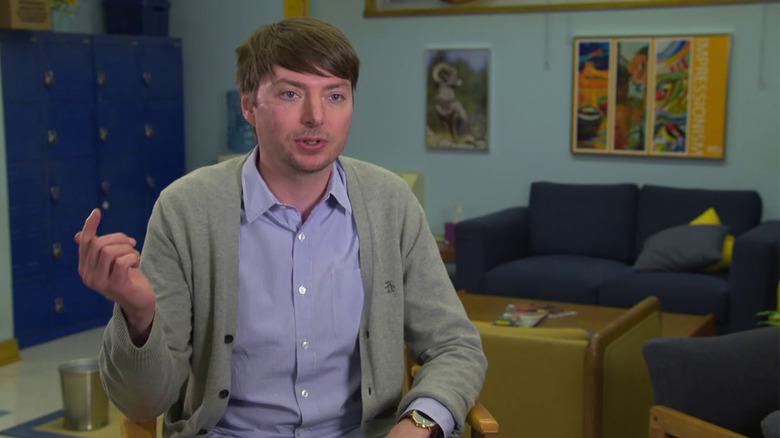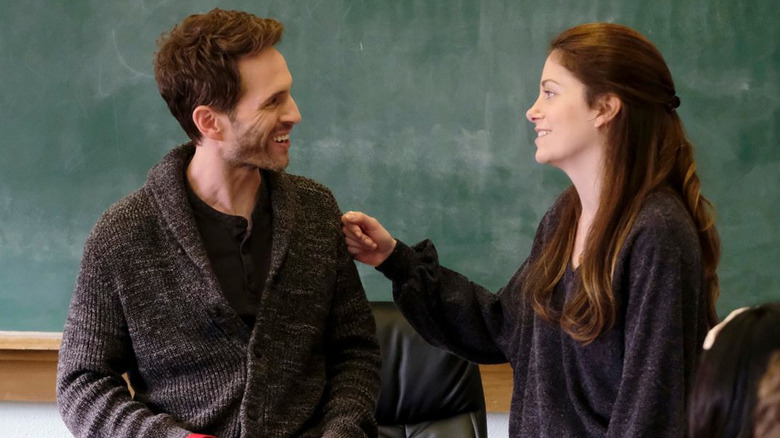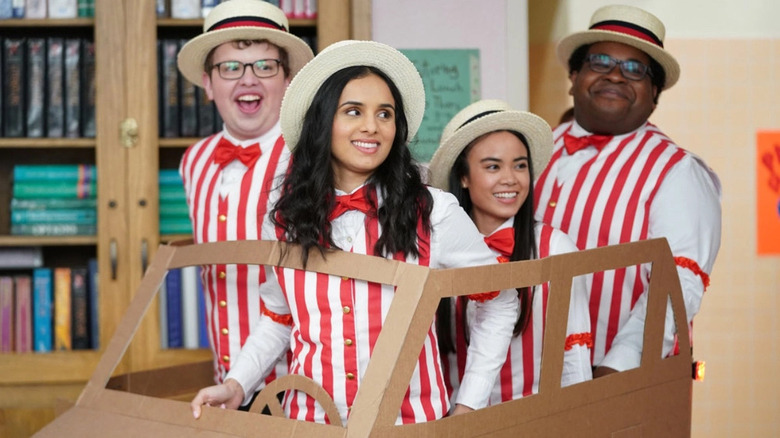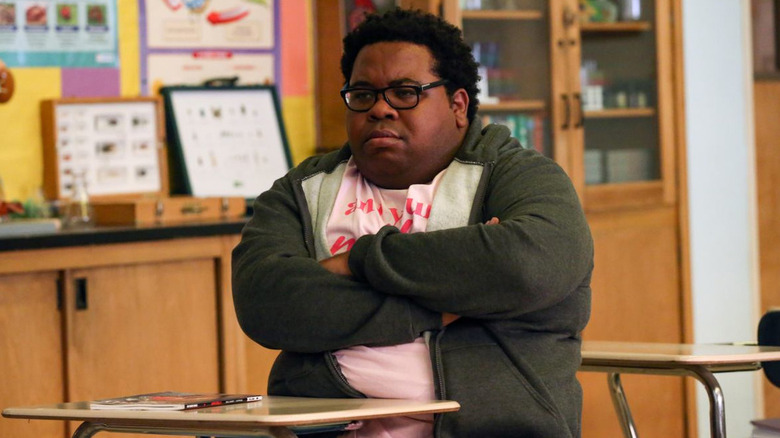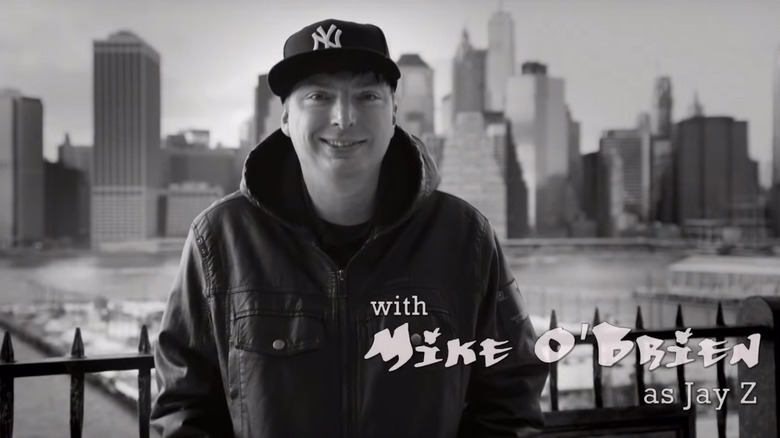A.P. Bio Creator Mike O'Brien Talks The Evolution Of Jack In Season 4 And More [Interview]
The fourth season of "A.P. Bio" is streaming now on Peacock. The season starts off with quite the disruption in Jack's life, and the rest of the season gets even weirder than the already oddball third season that preceded it.
Before the release of the fourth season, we talked to creator and showrunner Mike O'Brien about how the show has evolved since it first started at NBC. Plus, we talk about the incredible cast that makes up the class and how they almost weren't as integral to the show as they are now. There's also some spoilery discussion on Jack's character development and complicated love life, and we talk about whether we'll ever reach the end of a school year.
Find out about all those things and more in our full interview below.
I Am Jack's Relationships and Development
Note: This interview has been edited for content and clarity.
All right, so let's get right into it. I want to talk about the choice to have Lynette leave Jack at the beginning of the season. That feels like a season finale development. Why did you choose to do it at the beginning of the season? I feel like it works to the show's advantage, because if Jack evolves too much, then you start to lose the show. But if you give him one step forward, three steps back, you can still keep him in that space where he's dealing with the arrested development of his emotions.
I think that's well put, and I agree a hundred percent. And I think it also maybe puts stakes on all his dating. It's like in an action movie, if someone from the good guys get shot in the first act, then you're like, "Oh, anything might happen." You can't just have everything be perfect all the time or the tension of things goes down. So for Jack's relationships in Toledo to not always be perfect, end happily, be seamless, and have no fights or hiccups, that could get a little bit bland.
For sure. How did you figure out the balance of having Jack grow as a character, but not so much that it affects the comedy of the show with regards to his place in life?
We talked about it in a couple of different ways in the [writers] room because that's a constant balance. I think it's important that he should have some little growth moment every episode, but never so big that everything's just fine and there's no tension in the world. Sometimes an exercise that's good to do is to try to say what his growth is this episode and then see how we feel about the size of it. So you can say, "This is the episode where he realizes that it's good for Anthony to be able to participate in other outside things and that's important. And he should support that." That's not well-worded, but it's something that's small and good growth for him. As opposed to an episode where he learns to fully love all the students with all his heart forever. Then it would be too big.
The introduction of Shayla is an interesting development. Obviously it fills the recent romantic gap in Jack's life, but it also creates a new dynamic because she has similar kind of problems with commitment and allowing her emotions to come through. Is this something intended to last into future seasons? Is it like a Jim and Karen situation in The Office where maybe we'll still be waiting for Jack and Lynette to get back together at some point?
I think we enjoyed that we liked both relationships and we were working hard to make them feel very different. We liked that Lynette wasn't hands on her hips, like, "Oh, Jack, you're bad and everything." We made her like, "Whatever, dude, I don't care." She's a little cooler and more chill than him while Shayla is a little uptight, but not in [argumentative] way. There's a nice tension between them. Frankly, I think I would love to have more scenes between him and either of them, or maybe both eventually. We've tried to make it so that it'd be fun and exciting to see either one working out or not working out. Just more scenes between those pairings is great. And the three of them have great dynamics and chemistry, I think.
Breaking Formulas and Slowing Down Time
Where did the inspiration come from to start breaking from the formula that was established with the first two seasons? It felt like season three started to play with it a little bit, but season four, experiments even more by having these episodes that have a completely different style to them.
It's something I've always wanted to do. A lot of my favorite sitcoms growing up like "NewsRadio" would do it. The thing that felt exciting to me is that to try to make sure you never break what a character would do. They don't act any different than they would, but you can present their stories and episodes in a little bit different style sometimes or [by changing up] the rhythm or length of scene or scoring and playing with all that.
But you're also making sure these are all, in theory, real people that could exist in Toledo, Ohio, as we speak. Following that reality is really fun and then also pushing other things. We dabbled with it in season two, like a lot of people have done, by the real-time episode. We did the half-hour before school, and that was both the hardest and then most exciting one for the writers. So that's when we were like, "Oh, we got to do a couple more of these." The goal is to never have it be more than half the episodes as concept episodes, but we get up to half. I would say season four is maybe three out of eight. It depends on how you define it.
Speaking of defining things, I want to talk about the passage of time on the show, because there's not really an indication as to how much of the school year has gone by. Is that something that you guys might have to address at some point or will you leave it untouched until you have something that you want to do with it?
Well, the reason behind that is because A.P. students tend to be seniors, at least a lot of the students in reality would be seniors. So if we get to May of the school year, we have to have a hard discussion about the reality that a bunch of these students would graduate. But then we'd be losing these actors we love. So the vague timeline is about keeping these actors we love around as long as we can. But I would say it's a thing at some point.
If we're able to keep going, we're looking forward to committing at some point to saying, "All right, let's say it's April." Because there's a bunch of fun stuff to be done. They should have an A.P. bio exam. They should all know what college they're going to. They should have a prom and a graduation. And all those things are really juicy and fun. So the writers' room will be thrilled when we say this is the time we're going to say these students graduate. Then we'll have a very sad and hard discussion after that. Maybe they'll be volunteer interns for Durbin or something to keep them around. But technically they should graduate.
Yeah, if the show continues, some of them are going to maybe start aging out of that role.
Another writer and I are obsessed with that, and you can search "oldest actors to play high schoolers in TV over the years." It's all there for you, and we're not quite there. But that's one of the things that's worth it to me, to keep around this talent. I also don't even know their ages really, but I'm like, "Don't tell me." They might be 40 I don't know.
That's so good. Some of them are definitely older actors, but they fit so well in the classroom. They feel like real students and they each make me laugh in different ways.
A Comedic Class
I think one of my favorite things in the show comes from the reaction shots that you have from them when Jack is talking at the front of the classroom. Do you write those into the script? The cast is so big, I feel like you can't always get coverage of each of them reacting to whatever Jack is doing, but they all have such genuine reactions that are so funny. I was wondering how you pull that off in production.
It's a big discussion with each director, because I agree that a big, important part of the humor of the show is the look after the joke. We're always like any show, feeling like we're behind and racing. So there isn't a lot of picking up some reaction shots. What we'll do is each person, like a student, will have two lines in a big long classroom scene. At least once keep a camera on them all the way through the whole scene, even though they only have two lines. So you have Anthony at least just looking around, and you get a bunch of that.
Sometimes, if we're almost done with shooting in one direction towards the students, and if we have three cameras, I'll ask the director to just have the third camera just go around and get five seconds on everyone you can grab. So those ended up being like gold when you find them [in the editing room], because they aren't scripted, and I'm not even positive where we'll want them. It's in the edit that you realize this needs a little bit of a beat, or the editor found this great look from so-and-so, but it's never in the script, "Anthony rolls his eyes a little bit." That's all found in production in the edit. But they're so good at them that it really makes the show I think.
Yeah. Some of my biggest laughs have come from the reaction shots. They're hilarious.
Yeah. They're great.
Has the show gone in any directions that you didn't expect when you first conceived of it? I don't know necessarily how far you had planned out when the first season came along, but has it taken turns that you just leaned into? You're like, "Okay, yeah. Let's take this route now."
Definitely. Yeah. Speaking of the students, in my original concept of the show, it was supposed to be a high school show about the adults in a high school. None of those rols had shrunk, but the students have forced their way into almost equal weight as Helen and Durbin because they're so good. We have so much fun writing for them now. But I kind of pictured, there'd be a couple of students that speak, and that they'd say one or two jokes an episode, or not even jokes, they just say straight man lines to Jack. Then he'd go off on his missions and he'd talk to the other adults and all that.
To be honest, I think maybe I was worried about young actors pulling off comedy, and I've had tough experiences with that. These guys are just so good that it's grown to where we're like, "Guys, we don't have a Yuyao joke for this episode. And she's the 10th or 11th person to become a speaking member in the classroom, a former background actor. Now we're like, "We need a Yuyao joke this episode or the episode is just not complete." And if you told me that right after the pilot, that I'd be looking to serve around 10 or 11 students and making sure they all had a good two jokes every episode, it'd be crazy. But I'm really happy it's gone that way.
An Education at Saturday Night Live
You spent several years writing at Saturday Night Live and became a featured player there too. Since it's such a famous training ground for really cutting your teeth in comedy, both in writing and performing, what's something that you learned from SNL that you brought with you to a show like this and has helped you as it's gone on?
My first thought is just what a gift it is that [creator] Lorne [Michaels] gives writers right from the first year, that you are the showrunner of your sketch. You don't use that term in everything, but you realize that right from the beginning, you're making the choice on every costume, the set decoration, where the furniture should go. You help with the blocking. You can help with the camera angles. There's people who are really great doing all this stuff, but especially as you become a better writer, you also become more opinionated about that stuff. I didn't realize that I had six years of doing this sort of thing. Then I'd get into a costume department meeting as a showrunner for "A.P. Bio," and I've had six years of this exact sort of discussion. So it's an amazing training ground for that and really cool.
I think the other thing I'd say that jumped out is that I also got to work a lot with digital shorts. I made a lot of short films with Matt & Oz [Matt Villines and Oz Rodriguez] directing and everything. Sitting in the edits of those, I thin,k influenced how I oversee the editing of "A.P. Bio." Because I spent a lot of time [on those short films] and got to do a bunch of those, I started to develop opinions about the pace of an edit and that sort of thing.
Well, thanks a lot, Mike. I appreciate it. And I hope we get to see season five happen soon.
Absolutely.
The fourth season of "A.P. Bio" is streaming on Peacock right now. Be sure to check out our interview with "A.P. Bio" stars Glenn Howerton and Patton Oswalt over here.
